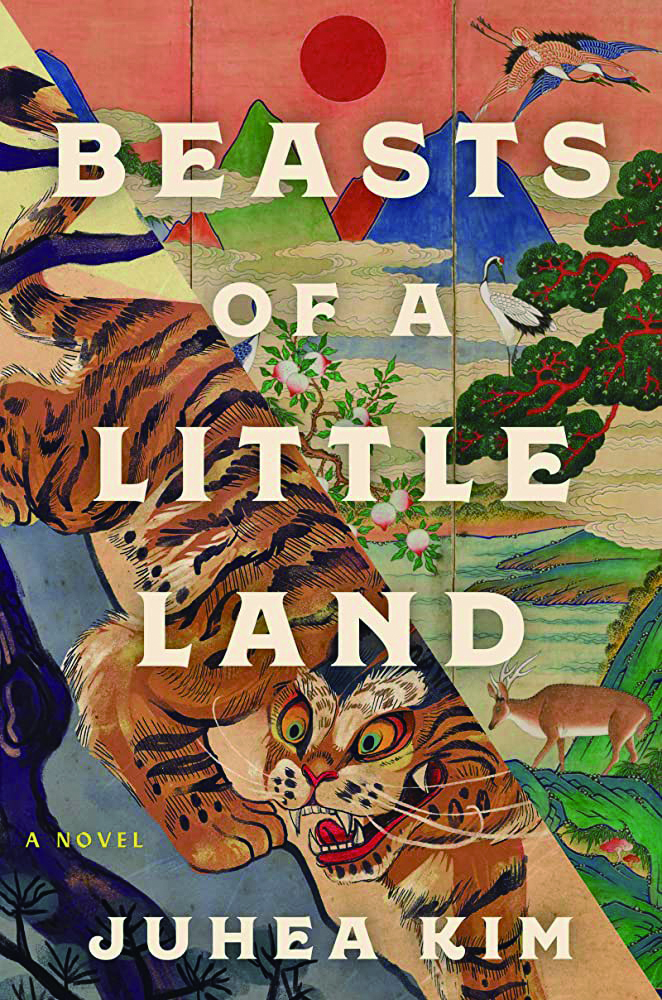‘Beasts of a Little Land’
By Juhea Kim, 403 pages, £8.99, Oneworld Publications: London [2022]
Bound Together by the Threads of Fate

Juhea Kim’s Debut Novel, Beasts of a Little Land, follows an ensemble of characters through the darkest decades of Korean history, from the early years of the Japanese occupation to the end of the Korean War and beyond. Jade, a young girl sold by her desperate parents to the courtesan house of Madame Silver in Pyongyang, f inds herself whisked off to Seoul, where she is to be raised as a courtesan by Dani. Meanwhile, Nam JungHo, an orphan boy from the countryside, travels to Seoul bearing only two mysterious heirlooms, and there he falls in with a street gang. Jade and JungHo meet by chance, and although their lives are set on very different trajectories, the threads of fate bind and reattach them through the years. These threads are woven throughout the narrative like the vibrant strands of a tapestry. In Korean, these threads are called inyeon, or the relationships that tie people and things together; Beasts of a Little Land vividly demonstrates how all these characters are integrated in the web of inyeon. Kim’s evident love and care for her characters ensures that this inyeon does not veer into fatalism but instead kindles a warm glow of comfort — the sense that, somehow, everything will be right in the end.
The novel is also a story about stories. Myth plays an important role throughout the work, whether it is the myth of Dangun, the ancestor of all Koreans, or JungHo’s own personal myth about his father. When Luna, Madame Silver’s daughter and one of Jade’s fellow courtesans, suffers an unwanted pregnancy, she recalls the Dangun myth. But instead of seeing it as an affirmation of her identity, she wonders why the myth only talks about the desperate female desire for children and never about the women who don’t want children. In this way she questions the universally accepted myth and shines a light on its function of social control. On the other hand, JungHo had always assumed that the myth of his father and the tiger was at least partly imagined, but he later discovers that there was more truth to it than he ever suspected.
With such a sweeping historical narrative and large cast of characters, it would have been easy for the work to succumb to sentimentalism, but Beasts of a Little Land earns its keep. All of the characters are painted with the brush of truth, and they leap eagerly from the pages. Even the most contemptible of the novel’s villains ultimately reveals a human side; even he cannot escape the web of inyeon that ties him to the others.
There is a memorable passage early in the book, when Jade joins Madame Silver’s household and becomes a courtesan-in-training. Although she is perhaps not the greatest singer — certainly not as talented as her friend Lotus — she takes to poetry like a duck to water. She cannot understand how her fellow courtesans-in-training can be so unmoved by the beautiful verses they read and recite. She has been introduced to a world of wonder, and it affects her viscerally: “She fluttered,” Kim writes, “with the knowledge that certain words in a certain order could rearrange her on the inside.” It’s hard not to hear the author speaking through Jade here. After all, it is the essence of Beasts of a Little Land: certain words in a certain order. Kim has fashioned these words into a work so beautiful and musical that the reader cannot help but be rearranged on the inside.
‘Nearly All Happiness: A collection of new poems by Lee Soyoun’
By Lee Soyoun, Translated by Sunnie Chae
89 pages, ₩9,500, ASIA Publishers: Paju [2022]
Experiencing the World as a Poet

In this collection of twenty poems by Lee Soyoun, we are invited to see the world through the eyes of the poet. It is a world that feels a keen connection with the earth, with all living things, and with the potential for life in all things. Lee is a poet who does not grow a garden but still believes in seeds, and like seeds her love for both the earth and humanity is scattered throughout the poems. It is an interesting approach — hurt by a world in which women are discriminated against, she chooses not to lash out but to embrace everything in love and hope.
As the poet writes in a note at the end of the volume, “each writer struggles to endure their own world, albeit in different ways.” Lee Soyoun’s world is one in which everything, no matter how trivial, is in and of itself a poem. To quote her again, “poetry is not a goal but a drive.” That is, poetry is not something that emerges from the poet’s experience of the world; it is in fact how the poet experiences the world. This volume brings her voice to new readers; as her world expands, so does ours.
‘STUDIO KIWA’
Beautiful Melodies in the Graceful Setting of Hanok
Universal Music Korea’s aptly named Studio Kiwa brings musicians from Korea and around the world to perform at a hanok (traditional Korean house), such as the Min family residency in Namsangol Hanok Village in Seoul. Kiwa is the Korean term for the dark tiles that adorn the roofs of hanok, and under these roofs Studio Kiwa assembles an eclectic mix of artists, including both contemporary and classical musicians. While it is not uncommon to see concert pianists performing in grand ballrooms, or indie bands taking to smoky stages before raucous crowds, somehow the simple elegance of a hanok becomes the perfect setting for both. Is it the warmth of the old wooden floors and rafters, or perhaps the quiet beauty of rain dripping from the eaves? Whatever it might be, Studio Kiwa gives us the chance to experience the music we love in a new and unique way.